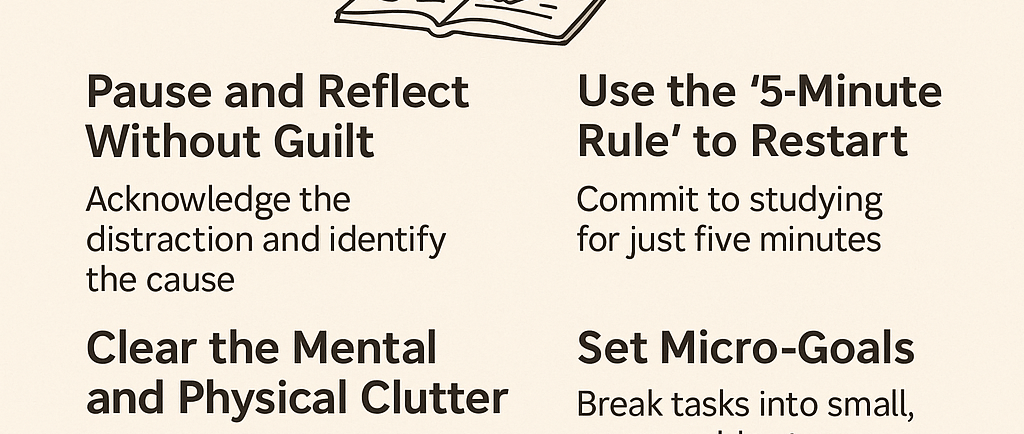How to Recollect Your Focus on Studies After Distraction


In today’s fast-paced digital world, distractions are everywhere—from buzzing notifications to endless scrolling on social media. For students, this makes it incredibly difficult to maintain consistent focus. But the good news is, no matter how far you’ve drifted, it’s always possible to get back on track. Rebuilding your focus on studies after a distraction doesn’t require perfection—just the right strategy and mindset
1.Pause and Reflect Without Guilt
The first step is to stop and acknowledge the distraction without beating yourself up. Guilt only adds emotional clutter and makes it harder to restart. Instead, ask yourself: What pulled me away? Was it boredom, stress, or a notification? Understanding the reason helps you deal with the root of the distraction and not just the surface.
2.Use the “5-Minute Rule” to Restart
After a break in focus, starting again can feel overwhelming. That’s where the 5-minute rule comes in. Promise yourself to study for just five minutes. Often, this simple trick helps overcome mental resistance, and once you begin, momentum builds naturally. It’s like reigniting a small spark to light a fire.
3.Clear the Mental and Physical Clutter
A scattered environment often leads to a scattered mind. Clear your desk, silence your phone, and close irrelevant tabs on your computer. More importantly, take a few deep breaths to calm your inner chaos. Even a short one-minute breathing exercise can reset your mental state and make it easier to regain focus.
4.Set Micro-Goals
Large study goals can feel intimidating and may lead to procrastination. Break your tasks into micro-goals. Instead of saying “I’ll study the entire chapter,” say “I’ll complete just two pages.” These small wins boost confidence and keep your brain engaged without overwhelming it.
5.Use Focus Techniques Like the Pomodoro Method
Time-tested techniques like the Pomodoro Method can work wonders. Study for 25 minutes, then take a 5-minute break. After four such sessions, take a longer 15-minute break. This approach respects your brain’s natural rhythm and trains your focus muscle over time.
6.Revisit Your ‘Why’
Motivation often fades because we forget why we started. Remind yourself why your studies matter—whether it’s a dream job, making your parents proud, or building a better future. Write your goal on a sticky note and keep it where you can see it. This reminder can refuel your determination when distractions strike.
7.Be Kind to Yourself
Distraction is human. Focus is not a natural state—it’s a skill built with practice. Instead of punishing yourself for losing track, celebrate your decision to come back. Each time you refocus, you’re getting better at it.
Final Thought:
Losing focus isn’t a failure—it’s an opportunity to learn how your mind works. The more times you bring your attention back, the stronger your focus muscle grows. With a few mindful steps and patience, you can turn every distraction into a stepping stone for deeper concentration and academic success.
